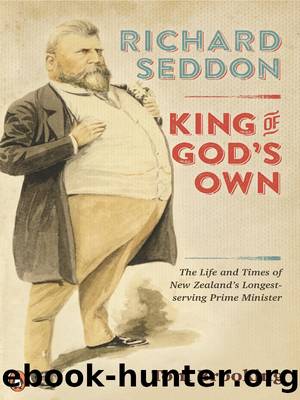Richard Seddon: King of God's Own by Brooking Tom

Author:Brooking, Tom [Brooking, Tom]
Language: eng
Format: epub
ISBN: 9781743486801
Publisher: Penguin New Zealand
Published: 2013-04-08T00:00:00+00:00
Mark Cohen, editor of the Dunedin Evening Star and a major supporter of Seddon, picked up this story and published it on 26 January 1900.71 Such criticism, especially when added to Greyâs complaint that Seddonâs labour reforms needed extension, proved too much for the Premier who wrote personally to Grey to complain.72 Grey replied with two pamphlets, and appeared before a parliamentary committee where he refused to change a word.73 Seddon responded by leading a debate in the House condemning Grey, who had also written another article in the New York Times on Australasian blindness regarding Germanyâs takeover of Western Samoa.74 After a lengthy debate the Premier secured a vote heavily in favour of Greyâs dismissal.75
Seddon seemed unperturbed by criticism from the normally supportive New Zealand Free Lance that such action against a senior public servant who had worked diligently for the Government for 24 years and never behaved in a partisan manner established a âparallel with the unreasoning brutality of a French mob in the days of Robespierre, or resort to the malignant methods of hidebound Toryism in the past history of Great Britainâ.76 The fact that the ministerial paper also praised Grey for his âconsiderable courageâ, insisted that he was not a Boer spy, and was entitled to his opinion as chief Hansard reporter, caused further embarrassment, as did its concern that making an example of Grey would only create a martyr.77 Support for Grey from William Thomas Stead, anti-war editor of the Review of Reviews in London, could be more easily dismissed, as could the protest of the Evening Post that the action was âdiscreditable to the Governmentâ.78 No apology or reinstatement was forthcoming, and Grey departed for a successful journalistic career in Australia. Seddonâs determination to make New Zealand into the most loyal colony in the Empire thereby led him to commit one of the most serious injustices of his career. It also set an unfortunate precedent for the treatment of dissidents during the First World War.
Even more alarming were suggestions of Seddonâs that New Zealand should create a citizen army to serve the Empire and that drill should be compulsory for all boys. Earlier in 1896 he had suggested that âevery youth in New Zealand ⦠should be trained to armsâ.79 Then in 1901 he argued for more âdrillingâ and training like that in Germany, and offered a reserve force to Chamberlain, an offer repeated at the 1902 Imperial Conference.80 Such thinking seems to support the suggestion that military enthusiasm provided an opportunity to develop a more disciplined or âtightâ society in which unity against a common foe would override class conflict and parochial rivalries.81 Yet this possibility passed, because as a parsimonious Colonial Treasurer, Seddon later dropped the idea of a permanent emergency force and compulsory training as too expensive. As an adroit populist he also sensed that the decline in enthusiasm for military involvement after the end of the war made it impractical.82 Arguably, Seddon also overestimated the performance of New Zealandâs amateur
Download
This site does not store any files on its server. We only index and link to content provided by other sites. Please contact the content providers to delete copyright contents if any and email us, we'll remove relevant links or contents immediately.
Machine Learning at Scale with H2O by Gregory Keys | David Whiting(4295)
Never by Ken Follett(3937)
Harry Potter and the Goblet Of Fire by J.K. Rowling(3848)
Unfinished: A Memoir by Priyanka Chopra Jonas(3381)
Fairy Tale by Stephen King(3370)
The Man Who Died Twice by Richard Osman(3072)
Will by Will Smith(2911)
Rationality by Steven Pinker(2352)
It Starts With Us (It Ends with Us #2) by Colleen Hoover(2344)
Can't Hurt Me: Master Your Mind and Defy the Odds - Clean Edition by David Goggins(2324)
The Dark Hours by Michael Connelly(2300)
The Storyteller by Dave Grohl(2229)
Friends, Lovers, and the Big Terrible Thing by Matthew Perry(2219)
The Dawn of Everything: A New History of Humanity by David Graeber & David Wengrow(2197)
The Becoming by Nora Roberts(2189)
The Stranger in the Lifeboat by Mitch Albom(2113)
Cloud Cuckoo Land by Anthony Doerr(2101)
Love on the Brain by Ali Hazelwood(2062)
Einstein: His Life and Universe by Walter Isaacson(2011)
